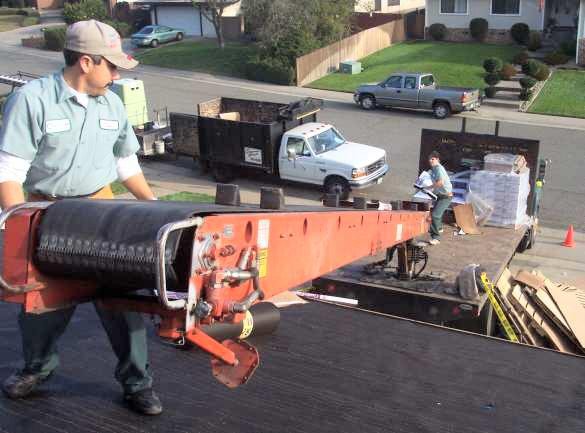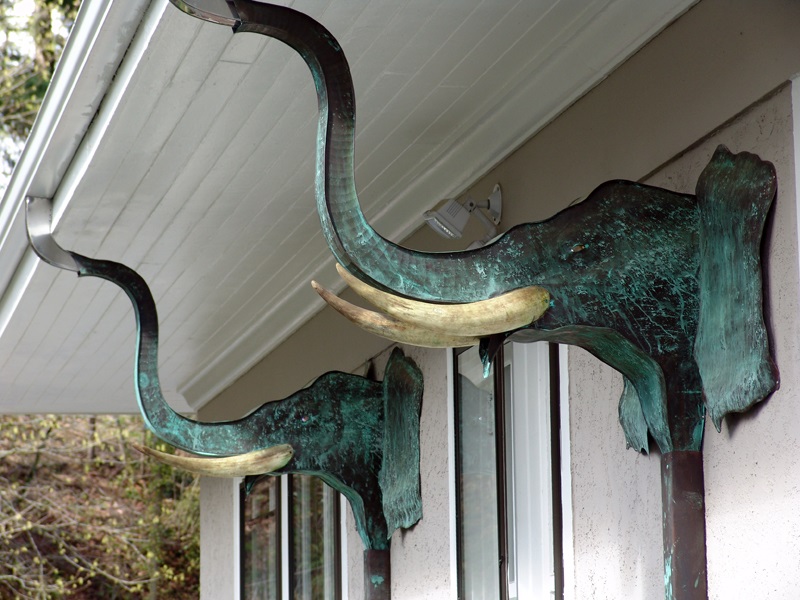Roofing Deposit - How Much Should I Give My Roofing Contractor?

The answer can depend on the state you live in and the contractor you hire.
I get asked this question quite often. The answer can depend on the state you live in and the contractor you hire. Some contractors ask for deposits, some don’t. Whatever you agree on, make sure it is in the contract so both parties understand. I think the best answer to this question is, the law in the state I live in, a contractor is limited to a deposit of 10% of the contract and not to exceed $1,000. There are exceptions to this rule if a performance bond has been filed. This is the law in California and it seems to work well for both contractors and home-owners. On a larger job, progress payments or material payments can be asked for at a scheduled time, dictated in the contract.
It all comes down to trust. Do you trust your contractor? Have you done the research on his or her license, registration and reputation? If you feel good about hiring the contractor, then a deposit is in order. If you choose to hire an unlicensed roofer, maybe a deposit of any size is unwise.
Let's look at the roofer's point of view. You are the one who called. Why should the contractor fund your job 100% and take that risk of not getting paid? Trust me, having myself laid out tens of thousands of dollars in materials and labor and to be at the mercy of someone not managing their money correctly is unnerving. It is you requesting the roofing services and the comfort level the roofing contractor has with you may dictate what the deposit may be.
What is a deposit for a roof? “It is a pledge to the roofing contractor to purchase a roof.” Some contractors will use these funds to get the job started. Processing the job in the office, purchasing permits, beginning labor costs for roof removal and ordering roofing materials delivered to the job site. Depending on the size of the roof a contractor can easily spend a few thousand dollars, just getting a roofing project started. So what is the correct amount for a deposit? Here again, in my state, we have limits but other states have different laws. It is up to you to know those laws and negotiate a deposit with your roofer, which is fair and both parties feel comfortable with it.
On an average size roof, that just takes a few days, most contractors may ask for a small deposit and the balance on completion. Some may just ask for the full payment at the end of the job. On a larger job that may last a month or two, a deposit and progress payments may be outlined in a contract to secure large orders of materials and labor expenses. Before you get ready to pay a deposit remember this, always write a check for any payments made. This is a record of money paid for your roof, where cash is more difficult to track if something goes wrong and a dispute arises. Never get ahead of the work done. This means at the time of signing a contract the contractor has very little expenses, other than advertising to get you to call him, and the estimating costs. Now I won’t be making any friends with my fellow roofing contractors but let's think about this, how can a roofer ask for 25-50% of the contract price when the job hasn’t really incurred any large cost? Consider this also, most contractors buy your materials at a supply house that bills them monthly. So should you pay for that material in a deposit? Only you and the contractor can answer that question.
Did you know, one of the biggest complaints made against contractors is “I didn’t understand?”
That’s why it’s important to ask questions and get every detail about the project written in the contract. This includes the deposit and any scheduled payments. Money can be a leveraging thing. If the contractor has more money than he has produced on your roof job, he has the leverage and if the homeowner has not paid for work provided, they have some leverage in a dispute. I was once told by a very large roofing contractor when I asked, "Why do you ask for a deposit and multiple progress payments?" He said, “If there is a dispute I have most of the money for the job in my hand.” That always struck me as if he was expecting something to go wrong, but you see his point?
Now everyone runs their business different but the reality is this. To start an average roofing project there are costs. Administration costs, salesmen/estimators, permits and purchasing materials and delivering these to the jobsite. If your contractor asks for a deposit, make sure you don’t get too far ahead of the work being done. Remember, contractors who are solvent in their business have a line of credit with their suppliers and should have operating capital to work with. If they don't have good credit and are using your funds to pay last month's bills, is this the contractor you really want to hire? Roofing contractors may not be out as much money as you think in the beginning.
It is also important to know, in some states like California, the suppliers along with subcontractors used on your job, may have lien rights for the unpaid materials delivered and labor done on your home. Every state has its own laws and it is up to you to know those laws. It is wise when you are paying for materials or subcontractors to keep records and to get unconditional lien releases from those parties. It is normal to receive a preliminary notice of these lien rights in the mail, so don’t be surprised, it is the law to notify you of their rights and action they can take if the contractor does not pay them. I know it is a pain for the contractors to provide lien releases, and I won’t be on their buddy list for these suggestions, but these are ways to protect your deposits and payments paid to the contractor. This website is here to inform the homeowners how to hire the best roofing contractors out there.
So how much is the deposit for a roof? That is up to you, your roofing professional, the bank and the state you live in. Do your research to make a wise but fair decision. Don’t be one of the people that gets burned and paid for a roof or large deposit only never to see the roofer again.
Have a question? AskARoofer.
Find your local roofing contractor in the RoofersCoffeeShop® Contractor Directory.










Comments
Leave a Reply
Have an account? Login to leave a comment!
Sign In